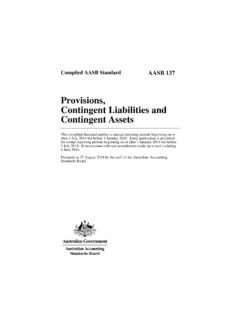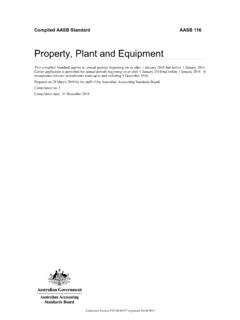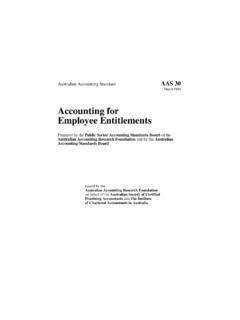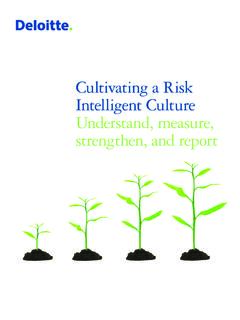Transcription of Policies & Procedures Legislative, statutory and industry ...
1 Policies & Procedures Legislative, statutory and industry requirements 1. australian accounting standards board The AASB is an australian Government agency under the australian Securities and Investments Commission Act 2001. Under that Act, the statutory functions of the AASB are: to develop a conceptual framework for the purpose of evaluating proposed standards ; to make accounting standards under section 334 of the Corporations Act 2001; to formulate accounting standards for other purposes; to participate in and contribute to the development of a single set of accounting standards for worldwide use; and to advance and promote the main objects of Part 12 of the ASIC Act, which include reducing the cost of capital, enabling australian entities to compete effectively overseas and maintaining investor confidence in the australian Tax Agent Services Act Defines what constitutes provision of a BAS Service, requires anyone providing such a service to be a registered BAS Agent and outlines the requisite qualifications and experience of registered BAS Agents.
2 It requires BAS Agents to hold Professional Indemnity insurance and prescribes a Code of Professional Conduct that BAS Agents must follow. It imposes a civil penalty of $27,500 on any non-registered bookkeeper posing as a BAS Agent. Privacy Act A Bookkeeper must be mindful of its duties and obligations under the Privacy Act. Specifically they must observe the requirement to ensure that its clients have the right to know what information an organisation holds about them and to correct that information if it is wrong . 1 Furthermore, all client data held must be kept secure and confidential and should not be transferred to an overseas organisation unless continued security can be guaranteed or the client has consented to the transfer . Trade Practices Act Like all businesses, a Bookkeeping business is subject to the competition component of the Trade Practices Act.
3 It is also bound by the fair trading legislation in the relevant state Fair Trading accounting Professional & Ethical standards board (APESB) In the absence of any specific set of standards for bookkeepers it is recommended that bookkeepers follow APESB standards where appropriate for bookkeepers . Full details of these standards can be found at . An extract is produced herein: General purpose of these rules is to provide standards of conduct for members of the Institute of Certified Bookkeepers which are appropriate to their conduct in their employment and practice and the preservation of the dignity of their profession. 2. The rules apply to all members of the Institute. 3. The rules apply to the conduct of members in all jurisdictions. 4. A member must comply with the requirements of these rules and any failure to do so shall constitute misconduct.
4 5. The board of the Institute shall have the power to waive the requirements of the rules in whole or in part and on such terms as it shall deem fit in respect of any of its members Interpretation 6. The following words shall have the meanings set out opposite them:- a. "The Institute" The Institute of Certified Bookkeepers b. "Member" Any member of the Institute of Certified Bookkeepers c. "services to the public" Any provision of services for reward other than to an employer 7. Any reference to the masculine shall be deemed to include the feminine, 8. Any reference to an Act shall include any subsequent re-enactment. The Fundamental Principles 9. A member may not engage in any activities which are likely to bring themself or the profession of bookkeeper or of the Institute into disrepute. A conviction for any criminal offence other than a road traffic offence shall for these purposes be deemed to amount to an activity which does or is likely to bring the member or the profession of bookkeeper or of the Institute into disrepute 10.
5 A member may not engage in dishonest or otherwise discreditable activities 11. A member must not compromise their professional standards or engage in or act so as to assist or conceal any criminal act even if by doing so the member may act contrary to the instructions of their client 12. A member is not obliged to accept any work and must not accept any work which: a. the member lacks sufficient expertise or competence to complete b. would involve the member or any other person in the commission of any criminal act c. the member does not have adequate time or opportunity to complete promptly 13. A member must promptly inform their client or their employer if for any reason if it at any stage becomes apparent that the member is unable to complete any work within a reasonable time of them being instructed to do so. 14.
6 A member must preserve the confidentiality of their client's or employer's affairs absolutely unless required to make such disclosure by law or by the direction of the Institute or to prevent the commission of a crime 15. A member must not hold client or trust funds for another without full accounting to the client and all funds must be separated from the business and personal funds of the member. 16. A member must not a. give tax advice that they are not otherwise permitted to provide b. give estate planning advice c. provide investment services or sell or give advice on the appropriateness of any investment within the meaning of the Financial Services Act 1986 Nothing herein shall prevent a member from doing any act they would otherwise be allowed to perform through their membership of some other professional body or under any current permission or licence granted by some other competent body 17.
7 A member must not make or prepare any account or record which they know is or may be false or misleading or the truth of which they are not satisfied on the materials or evidence before them. 18. A member must at all times be courteous to all those with whom they have professional dealings 19. A member should ensure that any advice given to a client is clearly and comprehensibly expressed 20. A member must not whether in their employment or in connection to their supply of services to the public describe themself or allow themself to be described as:- a. holding any designation or qualification the member does not currently hold or being a member of any body the member is not currently a member of b. being a BAS Agent unless the member is currently entitled to be so described through their registration with the Tax Practitioners board c.
8 Being a certified bookkeeper unless the member is currently entitled to through their belonging to the appropriate grade of membership of the Institute. Subject to the other requirements of these rules, a bookkeeper must always act in the interests of his client or employer in Public Practice 21. Subject to the requirements of these rules, a bookkeeper must always act in the interest of his client or employer. Public Practice 22. An Associate, Member or Fellow may provide bookkeeping services to the public provided that:- a. the member is qualified so to practice and holds a current practising certificate granted by the Institute b. the member holds a valid policy of professional indemnity insurance against claims for professional negligence together with insurance of not less than $250,000 23. A member should not undertake work for a client in which the member has a significant pecuniary interest or where the interests of the member and their client conflict, without prior written consent of all relevant parties 24.
9 A member entitled to provide bookkeeping services to the public may engage in any advertising or promotion provided that a. it conforms with the australian Code of Advertising Practice b. it is not inaccurate or likely to mislead c. it does not make comparisons with any other bookkeeper or accountant and it does not contain any derogatory remark or suggestion about any other bookkeeper or accountant 25. A member shall make and keep in place adequate provisions and arrangements for the continuation of their practice and the protection of their clients in the event of their death, illness or incapacity. 26. In any professional correspondence in relation to bookkeeping work with any person with whom the member has professional dealings, a member shall ensure that any letter the member writes discloses either any designatory letters the member is entitled to as a Bookkeeper after their name.
10 27. A member who is entitled to provide bookkeeping services to the public may trade using any trading name or style provided that a. the trading name is lawful b. the trading name is consistent with the dignity of practice operated by members of a professional body c. the trading name does not include the words "Certified Bookkeeper" or "Certified Bookkeepers" or indicate the business is a member of the Institute unless the principal in the case of sole trader practice or all the partners (unless otherwise specifically approved by the Institute) in the case of a partnership or all the directors (unless otherwise specifically approved by the Institute) in the case of a company are members of the Institute and are entitled to provide bookkeeping services to the public notwithstanding the foregoing, it shall be a defence for a member to have sought and been granted written approval by the Institute for any trading name 28.



